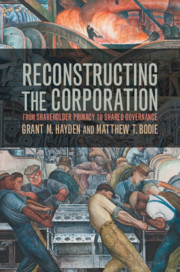Book contents
- Reconstructing the Corporation
- Reconstructing the Corporation
- Copyright page
- Dedication
- Contents
- Preface
- Acknowledgments
- 1 Introduction
- 2 Preference Aggregation in Political Institutions
- 3 Preference Aggregation in Corporations
- 4 The Corporation as Contract
- 5 Shareholder Homogeneity
- 6 The Argument from the Residual
- 7 The Argument from Arrow’s Theorem
- 8 The Shareholder Franchise and Board Primacy
- 9 A Firm-Based Approach to Corporate Voting Rights
- 10 Democratic Participation and Shared Governance
- 11 The German Codetermination Experience
- 12 Conclusion
- Notes
- Index
6 - The Argument from the Residual
Published online by Cambridge University Press: 18 February 2021
- Reconstructing the Corporation
- Reconstructing the Corporation
- Copyright page
- Dedication
- Contents
- Preface
- Acknowledgments
- 1 Introduction
- 2 Preference Aggregation in Political Institutions
- 3 Preference Aggregation in Corporations
- 4 The Corporation as Contract
- 5 Shareholder Homogeneity
- 6 The Argument from the Residual
- 7 The Argument from Arrow’s Theorem
- 8 The Shareholder Franchise and Board Primacy
- 9 A Firm-Based Approach to Corporate Voting Rights
- 10 Democratic Participation and Shared Governance
- 11 The German Codetermination Experience
- 12 Conclusion
- Notes
- Index
Summary
This chapter critically examines the argument for giving shareholders alone the right to vote based on their ownership of the corporate residual. The argument is that shareholders are only paid what's left over after all other contractual participants – employees, customers, creditors, and suppliers – have been satisfied. Because shareholders receive the marginal gains, they have the best incentives to exercise discretion on the part of the entire firm, and hence should be accorded ultimate control. Shareholders, though, are not the unidimensional profit maximizers used to get this argument up and running. Moreover, shareholders do not, by virtue of their relationship with the firm, have ready access to the information necessary to cast informed votes, and many shareholders – such as index fund shareholders – lack real incentives to seek out that information. Finally, this vision of shareholders as the sole owners of the residual is just descriptively wrong – employees, too, are invested in the long-term interest of the firm, cannot easily diversify that interest, and often possess firm-specific skills as well as contributions to the ongoing value of the business.
Keywords
- Type
- Chapter
- Information
- Reconstructing the CorporationFrom Shareholder Primacy to Shared Governance, pp. 88 - 102Publisher: Cambridge University PressPrint publication year: 2021



